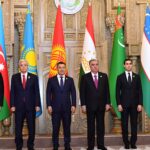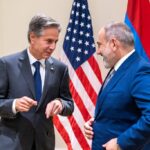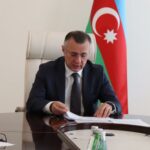Iscan highlights the complex global relations marked by numerous conflicts, emphasizing the recent unsettling developments within PACE, particularly against the Azerbaijani delegation. She expresses concern over these developments, sparking a broader debate.
“These measures, seemingly affecting Azerbaijan’s involvement in PACE, prompt questions about the fairness and justification of such restrictions. It is crucial to highlight the contradictory nature of these actions, as they accuse Azerbaijan of acts acknowledged by the international community as having been carried out by Armenia,” Iscan comments.
She further notes the recent Western actions against Azerbaijan, primarily led by France, questioning their inconsistency. “This occurs within the framework of recent unwarranted Western actions against Azerbaijan, primarily spearheaded by France. Questions arise about the inconsistency of these actions, given that Azerbaijan is a longtime ally of the West in Afghanistan, the North, and Iraq and also plays an important role in Europe’s energy security.,” she elaborates.
Iscan suggests a link between France’s aggressive stance against Azerbaijan and the decision not to confirm the accreditation of the Azerbaijani delegation. She warns that supporting Armenia’s unrealistic expectations and revanchist circles could endanger the peace process in the region. “The choice not to confirm the accreditation of the Azerbaijani delegation may be connected to France’s recent aggressive stance against Azerbaijan. Such actions pose a threat to peace, as backing Armenia’s unrealistic expectations and revanchist circles might jeopardize the peace process in the region. It appears that Armenia is not demonstrating enough sincerity in this process, as evidenced by all members of the Armenian delegation to PACE voting against Azerbaijan’s accreditation,” Iscan states.
Reflecting on Azerbaijan’s 23-year membership in the Council of Europe, Iscan observes political stability and restoration of affected territories, questioning the motives behind PACE’s attacks against Azerbaijan. “After 23 years of Azerbaijan’s Council of Europe membership, amidst political stability and the restoration of affected territories, certain parties in PACE have initiated attacks against Azerbaijan. This prompts questions about the motives driving such actions,” she adds.
Iscan criticizes the European Union for its unconditional alignment with Armenia and its biased stance towards Azerbaijan, which contradicts the EU’s declared values. “Presently, the European Union has opted to align unconditionally with Armenia, displaying biased and hostile attitudes towards Azerbaijan without regard for justice. This contradicts the declared values of the European Union and has the potential to escalate political tensions in the region. Europe’s policy of encouraging Armenia in the Caucasus and impeding peace processes runs counter to the principles professed by the European Union. This stance, supporting conflicts beyond its region for self-interest, gives the impression of double standards in diplomacy,” she concludes in her article.
The controversy escalated when Azerbaijan’s delegation credentials to PACE were challenged on the first day of the 2024 winter plenary session. Frank Schwabe, leader of the German delegation to PACE, proposed denying the Azerbaijani delegation’s credentials over allegations of “organizing the expulsion of Armenians from Karabakh.” This action followed dissatisfaction with Azerbaijan for not inviting PACE to observe the upcoming presidential elections on February 7. Prior to this, in October 2023, PACE adopted a resolution, perceived as one-sided and biased, regarding Azerbaijan’s anti-terrorist measures in Karabakh.










